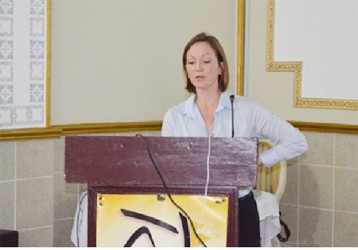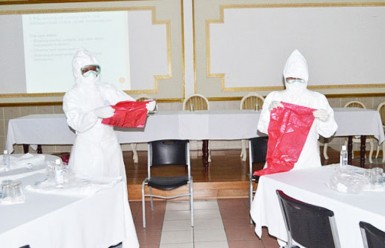Guyana has a mass preparedness campaign on stream for the dreaded Ebola virus and over 1600 medical personnel are to be trained on dealing with the disease.
This is according to Dr. Johanna Cole, Georgetown Public Hospital Corpora-tion’s (GPHC) Internal Medicine-Infectious Diseases, Consultant.
The Government Information Agency said that she was speaking at a Continuing Medical Education (CME) session yesterday morning at the Regency Hotel, Hadfield Street.
She said that 1, 600 medical professionals are to soon start training on dealing with the virus, and administering care to persons who have contracted the virus as opposed to those who are suspected to have it.
In addition, she said that emphasis will be placed on safety and precautionary measures for health care providers, who may come into contact with an infected person or environment, as the Ebola virus is highly contagious and spreads rapidly through direct or indirect contact with bodily fluids.

Over 4,000 persons have now died from the haemorrhagic disease in several West African countries and its virulence and the absence of a vaccine has stirred worldwide anxiety. The US and Spain have now reported one case each of health workers infected by patients from West Africa who were being treated at health facilities.
The Ministry of Health here has said that there is stepped up surveillance at ports of entry particularly of persons who have travelled from West Africa.
Dr Cole said, according to GINA, that meetings have been held to educate persons working at these ports of entry. She noted that isolation capacity is ready at the airports and the largest isolation housing unit is at the GPHC.
GINA said that Guyana has also moved towards establishing an action plan to deal with the deadly virus and a wide cross-section of stakeholders from various organisations had a recent meeting on steps to put the plan into operation.
At yesterday’s seminar, Dr Julian Amsterdam, Director of Standards and Technical Services, attached to the Ministry of Health, made a presentation on Infection Prevention and Control Guyana 2014. He spoke of the importance of protective gear when dealing with patients.
During, this presentation, GINA said that demonstrations were done on the correct usage and disposal of gear, such as gloves, suits and basic cleaning of the hands before and after dealing with patients and their surroundings.
This is seen as pivotal as many healthcare workers in West Africa and now the US and Spain have contracted the disease while treating patients.
On Saturday, Chief Medical Officer Dr Shamdeo Persaud called Ebola a frightening disease that should concern everyone and stressed the need for preparation.
He said the global situation is unpredictable and the Health Ministry has increased security at its borders and airports to prevent any possible entry of the deadly disease.
“Every vessel arriving at the Guyana-Suriname border is being closely monitored… while Lethem is being watched,” he said.

“We have been screening all persons flying from high-risk countries and these are not just West African countries,” he told Stabroek News, adding that persons were being identified by immigration and interviews conducted with them to know where they have travelled.
So far 27 persons have been identified to have travelled from West Africa and port health workers are checking up on them to ensure that no symptoms develop. He said the travellers were given contact numbers which they could call to alert the health ministry if they start to develop any symptoms.
“We are fearful about this…that’s why the measures are in place to stop Ebola from entering the country. Ebola is a very frightening disease and I, as the Chief Medical Officer, have a whole team of medical officers that I have to protect because they will be the first ones to be at risk,” he stated.
“So if the population is fearful then I will tell you the health sector is even more fearful… They not only become infected they end up taking it home to their family. So rather than saying we are ill-prepared I can say we have more work to do. We have dedicated ourselves to stopping the disease from entering Guyana,” he said. “The measures we have aren’t the best but they will have to kick in rapidly because, God forbid, we have our first case we need to be ready.”
Dr Persaud noted that the ministry was collaborating with the Georgetown Public Hospital and had secured an isolation ward for any eventuality. He indicated that they were stocking the ward with disposable clothes and equipment so that by tomorrow the hospital will be prepared.
“On Monday, we will start training staff at the hospital to use the personal protective clothes and also we have identified an ambulance to transport any affected person,” he said.
He said the ministry’s committee which was set up to stop Ebola from entering the country was getting ready to create awareness on the disease. “We are advising people to improve their sanitation and hygiene practices… washing their hands thoroughly and frequently, to be careful of how you dispose of waste especially fluids, foods and urine, stool because Ebola is transmitted by contact,” he stated.
“Also we are advising Guyanese not to travel to Africa because we don’t want anyone to be placed at risk,” he added.
Ebola
* Ebola is spread through direct contact (through broken skin or mucous membranes in, for example, the eyes, nose, or mouth) with blood or body fluids of a person who is sick with Ebola though objects (like needles and syringes) that have been contaminated with the virus.
* Ebola is not spread through the air or by water, or in general, by food.
* Healthcare providers caring for Ebola patients and the family and friends in close contact with Ebola patients are at the highest risk of getting sick because they may come in contact with infected blood or body fluids of sick patients.
* Exposure to Ebola can occur in healthcare settings where hospital staff are not wearing appropriate protective equipment, including masks, gowns, and gloves and eye protection.
* Once someone recovers from Ebola, they can no longer spread the virus. However, Ebola virus has been found in semen for up to 3 months. People who recover from Ebola are advised to abstain from sex or use condoms for 3 months.
Symptoms of Ebola include
- Fever (greater than 38.6°C or 101.5°F)
- Severe headache
- Muscle pain
- Weakness
- Diarrhoea
- Vomiting
- Abdominal (stomach) pain
- Unexplained haemorrhage (bleeding or bruising)
Symptoms may appear anywhere from 2 to 21 days after exposure to Ebola, but the average is 8 to 10 days.
Recovery from Ebola depends on good supportive clinical care and the patient’s immune response. People who recover from Ebola infection develop
antibodies that last for at least 10 years. (US Centers for Disease Control)





